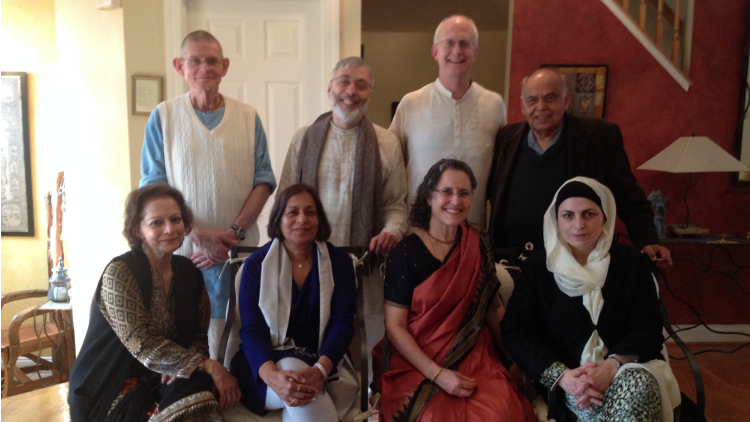Vaishnavas and Muslims Discuss Peacebuilding in 5th Annual Dialogue
By Madhava Smullen | Apr 25, 2014

The fifth annual Vaishnava-Muslim Interfaith Dialogue was held on Saturday April 19th this year in the Washington D.C. area.
After covering topics such as the name of God and “What do we Love When We Love Our God?” during previous years’ meetings, this year’s focused on peace and peacebuilding within the Vaishnava and Muslim traditions.
And while previous meetings were held at a series of retreat centers, this year’s dialogue added a personal touch by being held at the home of ISKCON Communications Director Anuttama Das and his wife Rukmini Dasi in Rockville, Maryland.
Just under twenty participants, including half from each tradition, attended, including professors, scholars and religious leaders.
The dialogue, which ran from 10:00am to 4:30pm, began by presenting two papers. The first, by local university professor Dr. Kirmani, covered Muslim concepts of peace building.
Giving a detailed analysis of when violence is authorized and not authorized in the Qur’an, Kirmani emphasized that violence should be restricted to self-defense. This he juxtaposed with the concept of Jihad, which he showed had been misinterpreted by religious extremists in the present day.
The word “Jihad,” he explained, actually means “struggle,” and is specifically used to denote one’s own struggle in spiritual practice, discipline, self-control, and ultimately service to God.

Ravindra Svarupa das (left) shares a thought with Muslim scholar Dr. Kirmani
Dr. Kirmani expressed frustration with the many extremist voices within religious communities, including the Muslim community, who justify violent acts through their own misinterpretations of scripture.
He also explained, with multiple references to the Qur’an, that respect for other religious traditions is a core principle of Islam, and that according to its holy scripture God intended there to be a variety of people and faiths so that we can learn from one another.
Next, Vraja Vihari Das, head of conflict resolution service ISKCONResolve, presented his paper Eight Inspirations From the Bhagavad-gita For Peace Builders.
These included the importance of patience in working with others, understanding that the three modes of material nature influence all people, learning to be aware of our own motivations whenever there’s a conflict, and the need to rise above our own selfishness.
He also talked about seeing the good in all others, referring to Bhagavad-gita 15.7 where Lord Krishna says,”The living entities in this conditioned world are My eternal fragmental parts. Due to conditioned life, they are struggling very hard with the six senses, which include the mind.”
“This means that everyone is ultimately good, and that the bad we see in others is superfluous to them,” Vraja Vihari explained. “This view can help us be less judgemental in resolving conflicts.”
The importance of treating all living beings equally was also raised, in connection with Bhagavad-gita 5.18, where Krishna says, “The humble sages, by virtue of true knowledge, see with equal vision a learned and gentle brahmana, a cow, an elephant, a dog and a dog-eater.”

Sharing thoughts on God and peace building
“To be effective as peace builders, we should look beyond prejudice, likes and dislikes,” Vraja Vihari commented. “It is important to notice our own prejudices and do our best to not allow them entrance into our own peace building.”
After hearing the papers, the dialogue participants shared a delicious vegetarian lunch catered by the Potomac ISKCON temple. They then spent the rest of the afternoon in open discussion on various topics.
They spoke about how often conflicts between religious communities are not based on religion, but on political motives. “There was a shared consensus that at the heart of our traditions, we have much in common, including respect, and even affection for each other,” says dialogue participant Anuttama Das. “But whatever differences there are are exaggerated and agitated for political purposes, and the whole world is suffering because of that.”
Members of both traditions also expressed their mutual concern that so many people within the broader Muslim and Hindu communities don’t take the time to learn about each other as individuals.
“In this highly sensationalized world we live in, where so many of our impressions of other people are formed by the media, our communities are often misrepresented in the public,” Anuttama says. “But when we take the time to become friends, and especially to learn about each other’s religious traditions, we see that we have much in common, and much to learn from each other.”
As the dialogue concluded, many participants commented that they found it to be a very spiritually uplifting experience, and spoke about the deep friendships that had been established over the years.
“I think many of us experienced what it should mean to live in a multi-faith world,” says Anuttama. “Which is that through our differences, we can help each other go deeper in our search for God and spiritual meaning.”












